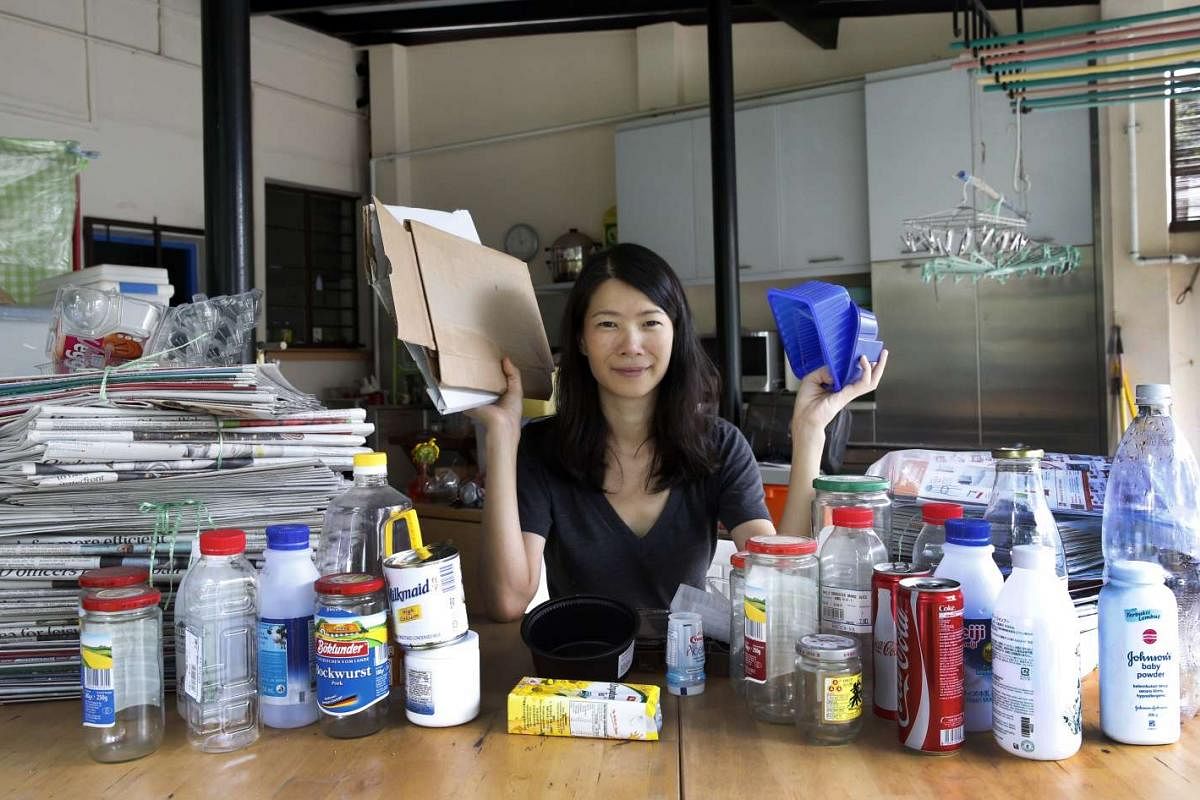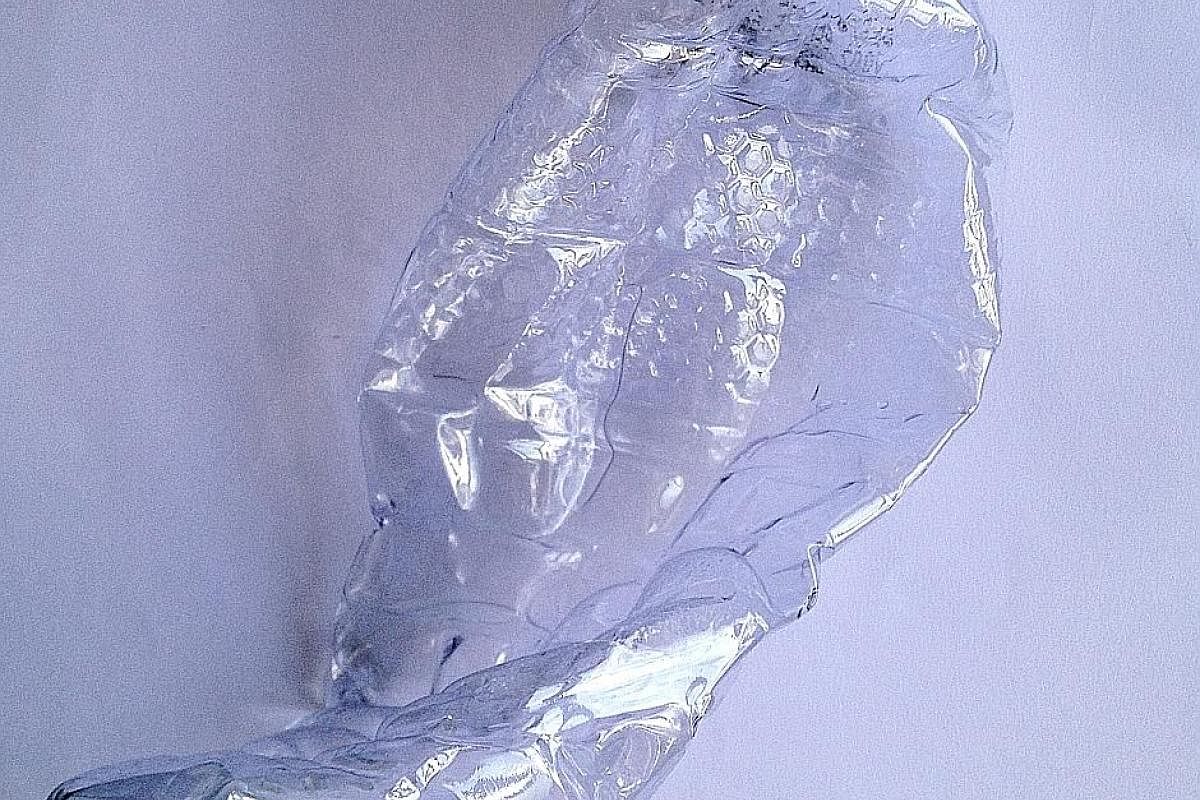-
NUMBERS IN A NUTSHELL
-
20 per cent
Singapore's household recycling rate in recent years. This means only one-fifth of the waste generated by a household is recycled. In contrast, the household recycling rate of Asian territories such as Taiwan and South Korea is around 40 to 50 per cent
-
8,284,000kg
The amount of waste Singapore disposed of in a day in 2015 - it is enough to fill 16 Olympic-sized pools
-
2035
The year Pulau Semakau, where Singapore's only landfill is located, is expected to run out of space
New campaign launched to encourage Singaporeans to recycle
As the take-up rate for recycling here is low, environmental groups are putting in more effort to raise awareness of the practice


Ask Ms Michelle Fong, 45, if recycling is good for the environment and she will say "yes" in a heartbeat.
Yet the manager in an interior design and renovation company does not recycle at all, preferring to send all waste down the rubbish chute.
"You can say I am lazy, but I do not want to spend the extra effort. I find it ma fan (Chinese for troublesome)."
Old newspapers and used containers, she adds, can clutter up her place and make it look unsightly. She lives in a four-room Housing Board (HDB) flat in Tampines with her two children, aged 16 and 22.
Her attitude is probably familiar to many Singaporeans.
Practical, time-strapped and space-challenged, people find it hard to make the effort to collect and sort recyclable materials from their trash, although they know that it is the virtuous thing to do.
Recycling has irrefutable benefits, such as the reduction of waste sent to landfills and incinerators, as well as the conservation of natural resources. It also helps sustain the environment for future generations.
But the take-up rate among Singapore residents is low.
The household recycling rate here has hovered at around 20 per cent in recent years. This means that only one-fifth of the waste generated by a household is recycled.
In contrast, the household recycling rate of Asian territories such as Taiwan and South Korea is around 40 to 50 per cent.
The amount of waste disposed in Singapore has increased seven times over the last 45 years, said environmental group Zero Waste SG.
In 2015, Singapore disposed 8.28 million kg of waste a day, enough to fill 16 Olympic-sized pools. At the current rate of disposal, the country's only landfill at Pulau Semakau will run out of space by 2035.
As the clock ticks, advocacy groups have been doing their part to raise awareness about the importance of recycling and how quick and easy it is to incorporate it into daily life.
Last month, Zero Waste SG launched a "Let's Recycle Together" campaign, recruiting more than 60 volunteers or "recycling rangers" to help out. On its website, it posted videos showing people who recycle talking about why they do it and also what can and cannot be recycled.
Later this year, the campaign will go to a as-yet-undecided district covering about 50 HDB blocks served by a recycling truck.
There will be posters and road shows sharing the what, why and how of recycling at void decks and common areas such as community centres. Volunteers will knock on doors and hand out fliers on the uses of the blue recycling bins in their neighbourhood.
The amount of recyclables collected will be tracked before and after the community engagement to find out how effective the engagement has been.
Zero Waste SG's executive director Eugene Tay, 39, says: "There is a lot of information about recycling out there, but we wanted to put a face to the information and engage residents directly."
Besides activism at the grassroots level, the Government has also taken several measures to get more people to recycle.
The National Recycling Programme was launched in 2001 to provide fortnightly collections of recyclables from HDB and landed homes. This extended to all households in 2009 when all condominiums were required by law to provide recycling receptacles within their estate grounds.
From 2011 to 2014, blue recycling bins labelled with information on what can and cannot be recycled were introduced progressively to all HDB blocks and landed homes.
Some believe more can be done at the national level.
Experts say the low domestic recycling rate is due to the high-rise rubbish chute, which allows trash to go out of sight and out of mind.
Mr Tay points out that residents pay a fixed waste disposal fee regardless of the amount they throw away. In contrast, in places such as Taiwan and South Korea, households pay according to the weight or volume of waste they throw away.
When contacted, a spokesman for the National Environment Agency (NEA) says the agency is studying the feasibility and effectiveness of such pay-as-you-throw schemes.
Other environmental experts suggested having better infrastructure, such as more recycling bins and chutes.
Associate Professor Tong Yen Wah, from the engineering faculty at the National University of Singapore, says: "Right now, there is usually only one blue bin at each HDB block. When the bin is filled, people may not be motivated to add more recyclables to it."
The NEA is working on improving the recycling infrastructure.
Since January 2014, recycling chutes have been installed at the lift landings of each floor of new HDB Build-To-Order developments to make recycling more convenient.
From April next year, the NEA will be mandating the provision of recycling chutes for all new development applications to build non- landed private residences of more than four storeys.
Plans for a comprehensive national e-waste management system, which would cover both the collection and recycling of e-waste, are also in the works. E-waste refers to electrical and electronic equipment of any kind that has been discarded.
But these improvements will have little impact if residents do not want to recycle or know what to recycle.
Prof Tong says that although information is printed on the blue recycling bins, there is still uncertainty about what should go inside. He adds that ground-up campaigns such as Let's Recycle Together will help clear up any confusion.
While the NEA says it is on track to reach the household recycling rate target of 30 per cent by 2030, Mr Tay hopes for a higher figure.
"It would be quite sad if our household recycling rate is only 30 per cent 13 years later," he says. "But if all the stakeholders work together, I believe we can achieve a higher household recycling rate by then."
•To join the Let's Recycle Together campaign as a recycling ranger, go to www.facebook.com/zerowastesg. The first training workshop is on Wednesday from 7 to 9pm. For details, go to www.zerowastesg.com/recycle
Join ST's Telegram channel and get the latest breaking news delivered to you.
A version of this article appeared in the print edition of The Straits Times on April 29, 2017, with the headline New campaign launched to encourage Singaporeans to recycle. Subscribe
